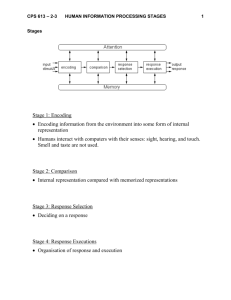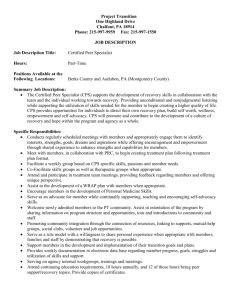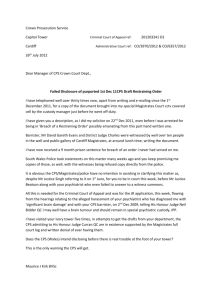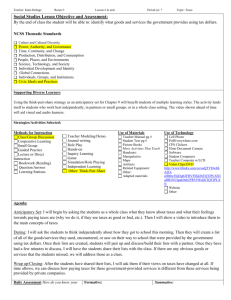Slides
advertisement
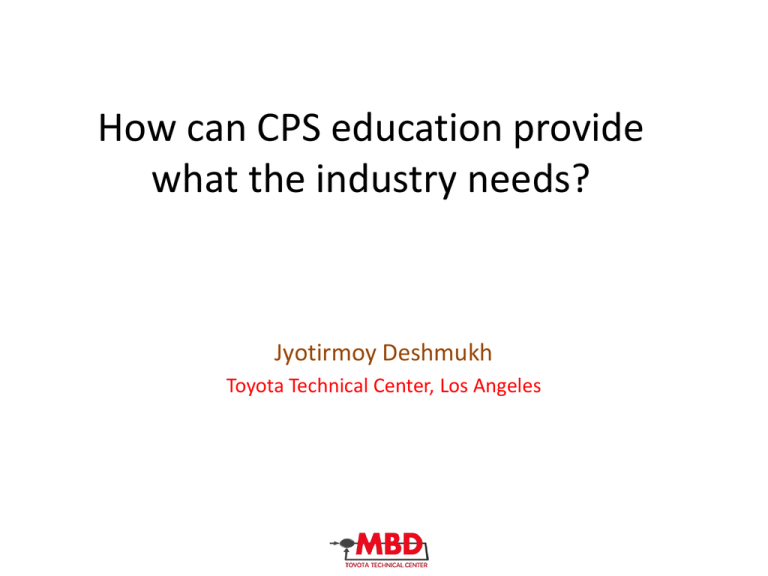
How can CPS education provide what the industry needs? Jyotirmoy Deshmukh Toyota Technical Center, Los Angeles What do “CPS people” in automotive industry do? Research and Advanced Development Design control software for new hardware Model hardware, environment for software Exhaustively test and worry about correctness Research/ Advanced Development Advanced Production Development Production What do “CPS people” in automotive industry do? Advanced Production Development Map software to a particular platform Integrate their software with legacy software Exhaustively test and worry about correctness Research/ Advanced Development Advanced Production Development Production What do “CPS people” in automotive industry do? Production Calibration and Tuning Occasionally fix logic issues Exhaustively test and worry about correctness Research/ Advanced Development Advanced Production Development Production Research & Advanced Development Needs Control Design Theory Linear systems theory: Basic linear algebra, PID control, Frequency domain analysis, Gain/Phase margin, Bode plots, etc. Nonlinear systems: Lyapunov theory, Feedback linearization, etc. Control algorithms: MPC, Sliding-mode, State-Observation and Estimation Implementing control algorithms Control Design Tools Matlab® Simulink® and its toolboxes LabView™, and related tools Optimization tools and packages Research & Advanced Development Needs Modeling Theory Causal versus acausal modeling ODEs vs DAEs Model order reduction (Rigorous transformations vs. approximations) System identification Making models fast Modeling Tools Modelica language: Dymola, OpenModelica Maplesoft tools Simscape from The MathWorks Research & Advanced Development Needs Verification/Validation/Testing Theory Software testing: Test-case generation, code coverage. Real-time computing Formal Requirements in Logic Hybrid & Continuous dynamical systems theory: Reachability analysis, Stability theory, Invariants Verification/Validation/Testing Tools Not many standard tools Current state-of-the-art: Open-loop : Simulink Design Verifier, Reactis, EmbeddedTester, LabView™ and related tools, dSpace, Model checkers, …. Closed-loop: (Testing) S-TaLiRo, Breach; (Verification) SpaceEx, Flow*, Model checkers Advanced Dev + Production Dev Needs Real-time Software Theory Models of Computation: Asynchronous Messagepassing vs. Synchronous Dataflow vs. Discrete-Event Systems Schedulability, Worst-case Execution Time Analysis Software/Hardware architectures Real-time Deadline-driven Concurrency Analysis Skills: Knowledge of standards such as AUTOSAR, MISRAC, DO-178B, ISO 26262 What will an ideal CPS engineer look like? Three Masters degrees, Two PhDs, plus 10years experience? Let’s look at what we can add: How could we CPS up a CS major? How could we CPS up an EE/ME (controls) major? Switch from CS to CPS is generally harder Control software development is different: You don’t write code, you “draw” specs, generate code (e.g. Simulink, Ptolemy, TargetLink etc.) Memory management is simplistic: shared memory organized in global variables No object-oriented-ness, no functional languages Very few pointers, dynamic typing, etc. Formal Methodists often cringe at qualitative requirements Switch from CS to CPS is generally harder CS curricula generally: Avoid ODEs, real numbers Rarely include real analysis, Laplace transforms, etc. Give students strong skill-set to be successful at traditional “software engineer” positions at Google, Facebook, Microsoft, Amazon, making apps, etc. Big challenge: How to generate excitement about the CPS challenges in mainstream CS? Controls to CPS easier, but need upgrades Controls curricula generally do not stress: Formal methods, Automata theory (e.g. hybrid automata) Distributed Systems Logical requirements Compare: (𝑡𝑠𝑒𝑡𝑡𝑙𝑒 ,∞) 𝑥 < 0.01 Step response looks good Formal Verification vs. Testing Controls to CPS easier, but need upgrades Multi-core platforms are coming! Need training in concurrency theory, synchronization, memory models, schedulability, etc. Hardware and software architectures V2V communication, active safety, driver assistance systems are already here Big data is coming Machine learning, Data mining techniques will become prevalent Abstraction/Refinement, logical foundations for sound reasoning, Compositional reasoning What the industry should also need (but is currently not) Very little focus on correct-by-construction design Design by abstractions and refinements Enormous strides in program synthesis, SMT, SAT can be leveraged Hardware (mechanical components) and Software evolve independently and simultaneously Makes verification, testing, calibration arduous and difficult: the shifting target problem Formal Requirements Even “as-is” requirements are not common How do I design “improve gas-mileage?” CPS academia and industrial CPS: Symbiosis? Industry → Academia Challenge problems: verification, design Representative models E.g. Berkeley’s MOOC course: Internships! Partnership of UCB with NI, excellent example of crosspollination Academia → Industry Tools, tools, tools! Scalability, simplicity over features Solutions to challenge problems Thank You!
